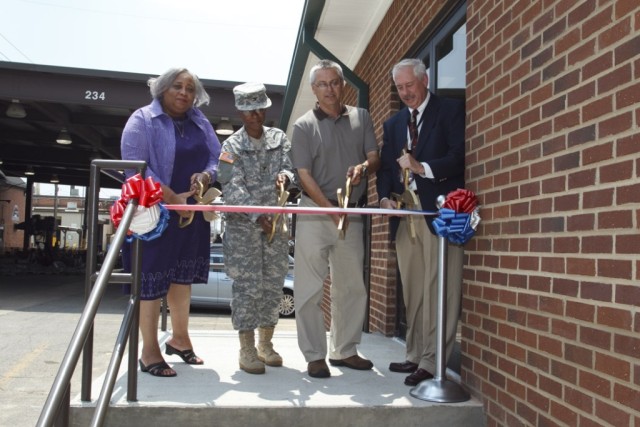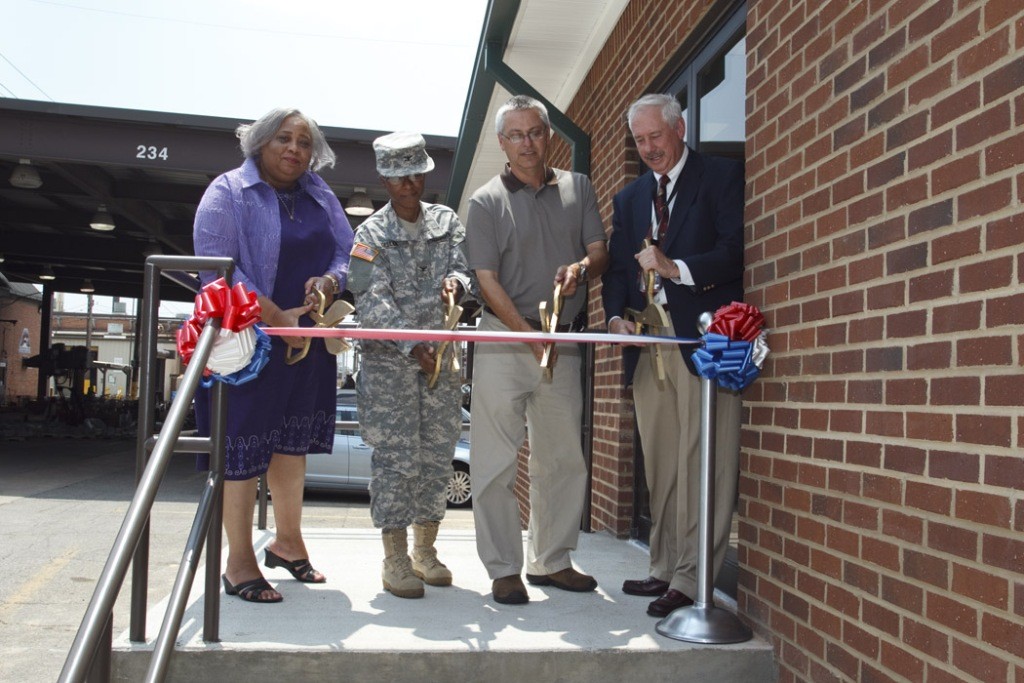
ANNISTON ARMY DEPOT, Ala. - The grand opening of a facility that will house administrative operations for the installation's counseling and recreation services is expected to save Anniston Army Depot around $244,000 annually, avoiding wasted productivity in the repair and refurbishment of combat vehicles and small arms weapons, said Jim Webb, director of community and family activities.
Depot officials cut the ribbon Aug. 10 at the Nichols Center, a small, multi-purpose office building in the Nichols Industrial Complex that, Webb said, will be ready for patrons by the end of September. The center and the complex are both named for former U.S. Rep. Bill Nichols from Alabama who served on Capitol Hill from 1967 until his death in 1988.
Located on the north side of Bldg. 130, Nichols Center - Bldg. 508 - will serve as a one-stop shop for employees conducting business with the Employee Assistance Program coordinator and Morale, Welfare and Recreation staff, among other service providers. Before the building's most recent makeover, Bldg. 508 was being used as office space for defense contractors.
"The building is small, but the dreams are great," said Webb. "If you had seen this building 90 days ago, you would have thought it was more worthy of a match."
The center has 1,800 square feet of space with two handicap accessible bathrooms, a break area and three offices. While the MWR services and fresh interior design at Nichols Center appeal to thousands in the industrial complex, it's its location that's got everyone talking.
Of the depot's 5,000 Department of the Army civilians, more than 3,000 of them work in the Nichols Industrial Complex. Looking at the workforce's geographic concentration alone, opening the Nichols Center seemed like a no-brainer.
However, leaders were even more convinced of the facility's worth after looking at the number of people in the NIC who see the EAP coordinator for help with problems affecting their work.
EAP is an administrative program that provides screening, referral, short-term counseling and follow-up services to employees and their families, said EAP coordinator Boyd Scoggins. Preventive education is also a part of EAP.
Scoggins said his office screens people for alcohol and drug abuse and for marital, emotional, behavioral and financial problems.
"Employees may self refer to our program or may be referred to our program by supervision or union officials. We even have medical referrals, investigation and apprehension referrals, family referrals and referrals from outside service agencies," said Scoggins.
Before the Nichols Center opening, more than 80 percent of employees seeing the Employee Assistance Program coordinator were traveling about five miles from the Nichols Industrial Complex to the EAP office in Bldg. 94. To get to these appointments, most people use taxi transportation provided by the depot's motor pool.
Webb and Carol Mitrisin, a former ANAD employee who now works at Fort McPherson in Atlanta, observed the process in 2007 and found that, for each one-hour appointment, the time required away from the job was around three hours. Mitrisin was working to obtain a Green Belt certification in Lean Six Sigma and used employee counseling as her project's focus.
Research showed that of the 1,780 EAP appointments made in one year, 1,422 were from the industrial complex. According to DCFA's study, 2,884 hours, or $244,101, of productivity in transportation and wait time was wasted in one year by employees traveling to and from their EAP appointments.
These calculated savings do not include fuel and vehicle use. It also does not take into account the time employees spent traveling from the NIC to Bldg. 94 for random drug testing.
The depot is looking to expand its drug testing, said Mike Proper, drug testing coordinator. If the proposed policy takes effect, more than 1,000 employees would be added to the 1,300 names currently on the random drug testing list.
"A drug test area in Nichols Center would prove invaluable with regard to saving time and providing efficiencies," said Proper.
Webb said the center was built with funds from Installation Management Command and required very little impact on Army Working Capital Funds.
"This is a win-win for both the depot and IMCOM," he said. Harry Campbell, a painter leader, said it's a positive thing that DCFA is bringing these sought-after services closer to the preponderance of depot workers, and he said the new facility will also help inform more people about the meeting facilities and outdoor activities offered on the installation.
"It'll be an asset," said Campbell. "There are so many outreach programs and facilities here that people don't know they have access to."
"This is a wonderful thing," said forklift operator Sonora Coleman.
One office in Nichols Center will be staffed with people who can assist with the following: MWR access cards, depot hunting/fishing permits, equipment rental (the rentals will remain in the depot's west area), reservation of facilities like Berman- Varner House and meeting facilities in the DeSoto area, Child Development Center registration, gift certificates to Java CafAfA and DeSoto Pastime Center, depot apparel (e.g. Polo shirts) and the sale of small consumables like snacks and travel-size medication.

Social Sharing